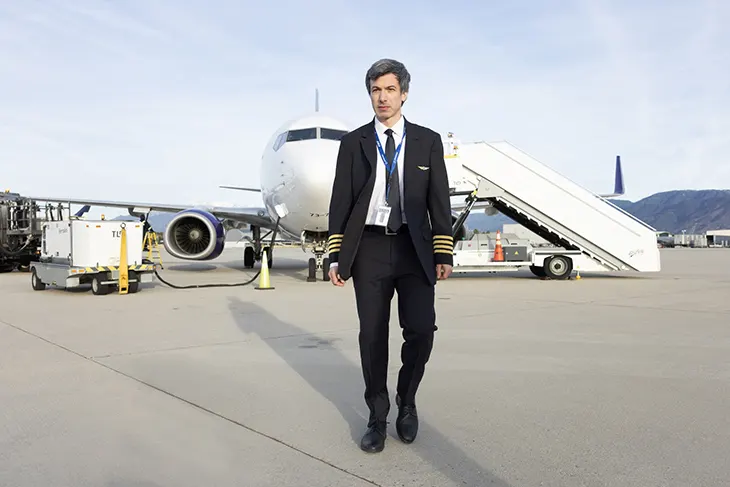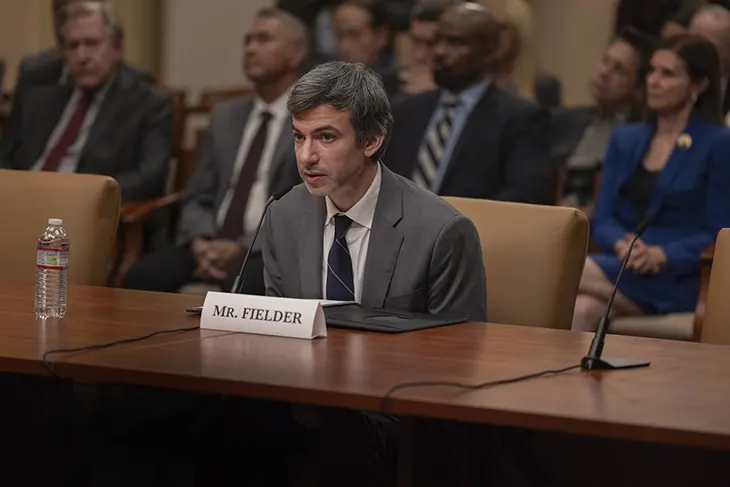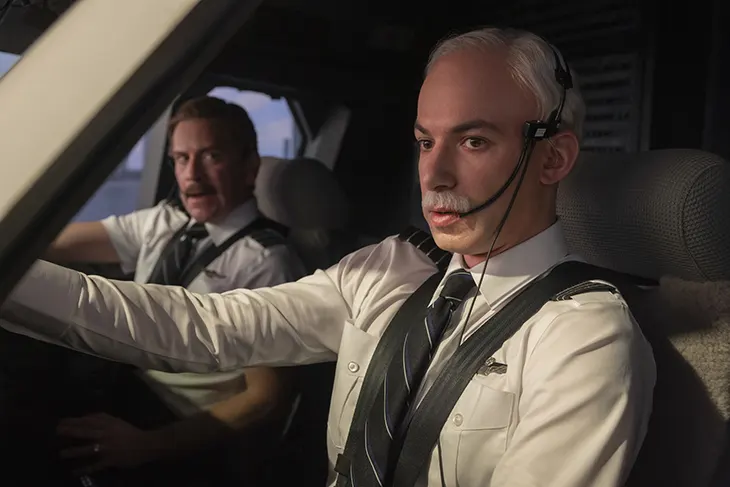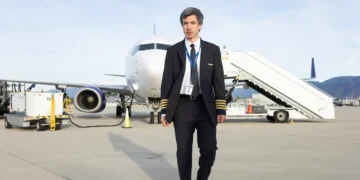
Nathan Fielder has never been interested in playing by television’s rules. In The Rehearsal Season 2 finale, he abandons them altogether, trading the safety net of scripted TV for the cockpit of a real Boeing 737. For a show that has routinely flirted with the limits of what rehearsal, reality, and performance mean, this act felt like both a natural escalation and a shocking detour. Fielder, who has long blurred the line between sincerity and satire, takes that ambiguity airborne in a literal act of transformation. He doesn’t just simulate being a pilot, he becomes one.
TV
The season builds on the premise that Fielder is helping airline pilots improve their communication through rehearsals. But that surface-level narrative quietly unravels as the episodes unfold. From bizarre singing competitions to puppets to dog cloning, the plot feels more like a surreal maze than a linear story. The finale, however, reveals a hidden agenda: Nathan Fielder has been training in secret to become a licensed commercial pilot. He hasn’t been preparing other people for high-stakes moments, he’s been preparing himself. The mission was never entirely about aviation safety. It was about control, identity, and maybe even redemption.

This bombshell shifts the entire season into a different register. While earlier episodes seemed to wander, the finale repositions them as elaborate misdirections – a meta-rehearsal of sorts. Fielder, ever the magician behind the curtain, plays the long con with his audience. When he finally sits in the pilot’s seat of a real aircraft, there’s a rare moment of silence. No music, no dramatic build-up. Just Nathan Fielder, co-piloting a jet through the sky with the weight of his personal doubt pressing harder than gravity.
To watch Fielder’s ascent into the cockpit is to witness a form of method acting pushed to absurd extremes. But this isn’t Raging Bull weight gain or Daniel Day-Lewis cobbling shoes. This is high-stakes, FAA-regulated, jet-fueled immersion. And unlike his earlier stunts, from reviving a bar by declaring it a legal play, to impersonating a Bill Gates impersonator, this one has very real consequences. The performance could go wrong in ways that no audience laugh track could undo. It’s also strangely poetic. Fielder, who has long built his persona on social discomfort and emotional disconnect, chooses aviation, a world ruled by protocol, precision, and pressure, as his ultimate rehearsal space.
If Season 1 of The Rehearsal was about preparing for fatherhood, Season 2 is about preparing for personhood. A thread running through the episodes involves speculation about Fielder’s neurodivergence. He consults doctors, undergoes an fMRI, and even attempts to discuss the implications of an autism diagnosis with a member of Congress. The suggestion is clear: he’s trying to understand why connection feels so difficult, why human interaction continues to function like an unfamiliar operating system.
Of course, the applause comes. After he lands the plane, safely and without incident, Fielder steps out to greet a cheering crowd of actors and participants from the season. It’s the kind of climactic reward usually reserved for underdog sports movies or tearjerker biopics. But in The Rehearsal, applause is always suspect. The ovation feels earned, but also artificial, much like the show itself. Fielder acknowledges as much in voiceover, noting that none of the clapping people truly know the extent of what he’s gone through. “As long as you get everyone down safely, that’s all it takes to be a hero,” he says. There’s gratitude in the line, but also resignation.

Flying, then, becomes a metaphor for that distance, from others, from emotion, from clarity. The empty planes he pilots later in the episode become symbols of both achievement and solitude. After successfully flying a jet filled with actors, he begins quietly shuttling empty aircraft between remote locations, as if trying to prove to himself that he’s truly capable. He has reached a level of competence that allows him to physically soar, but the cabin remains vacant. There are no passengers, no family, no friends, just Fielder and his gnawing uncertainties, cruising above it all. The image is absurd and a little tragic. It’s also, somehow, deeply Nathan.
It’s a fitting ending for a season that spirals outward only to snap back inward. Fielder never fully steps outside the show’s own elaborate scaffolding. His greatest trick remains making you question whether there was ever a line between sincerity and satire in the first place. The pilot license, the diagnosis, the performances, none of it is a joke, and all of it is. That’s the contract Nathan Fielder makes with his audience: we agree to laugh, to cringe, to marvel, even when we’re unsure whether we’re watching real life or a very convincing rehearsal of it.
In the final moments, Fielder’s voice lingers over footage of him flying alone, above the African desert. “They only let the smartest and best people fly a plane of this size,” he says. “So if you’re here, you must be fine.” It’s a haunting affirmation. The show, which began as an attempt to prepare for uncertainty, ends with the most uncertain message of all: that success may not mean resolution, and safety may not mean peace.
Flying a commercial jet in a television show should feel insane. And it is. But for Nathan Fielder, it also makes perfect sense. The rehearsal never ends, it just moves to higher altitudes.



















